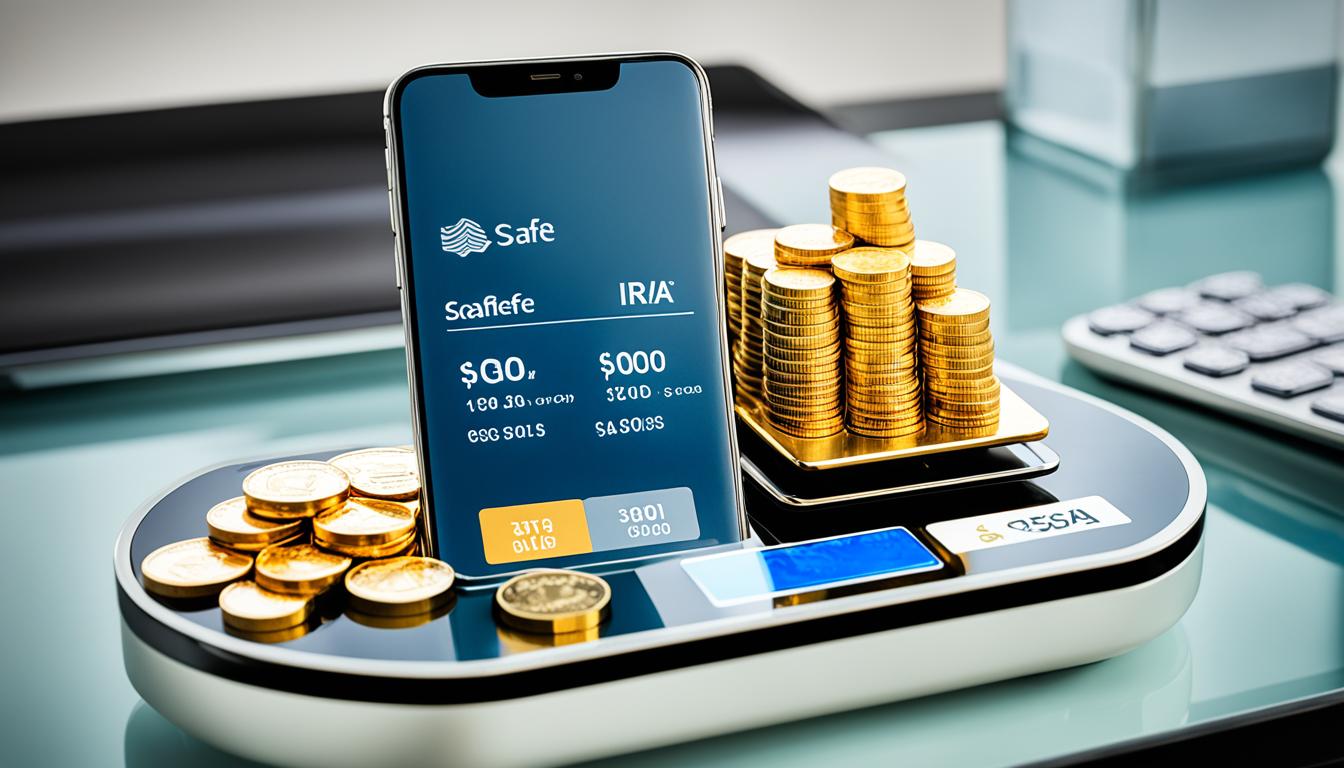When comparing a Gold IRA to holding gold at home, the tax benefits of a Gold IRA clearly stand out. Contributions can be tax-deductible, and you’ll enjoy tax-deferred growth, delaying capital gains taxes until withdrawal. In contrast, gold at home involves after-tax purchases and potential capital gains tax on sales. With Gold IRAs, you can also benefit from tax-free distributions in retirement. Want to explore more about security, liquidity, and flexibility in your investment options?
Key Takeaways
- Gold IRAs offer tax-deductible contributions, reducing taxable income compared to after-tax purchases of gold held at home.
- Gold IRAs provide tax-deferred growth, avoiding capital gains tax until withdrawal, while selling home-stored gold can trigger immediate capital gains tax.
- Roth Gold IRAs allow tax-free distributions in retirement, unlike gold held at home, which does not offer any tax advantages.
- Holding gold at home incurs no initial tax benefits and has no deductible losses unless insured, complicating financial management.
- Gold IRAs enforce mandatory distributions at age 73, adding complexity, while home-stored gold avoids such requirements, simplifying ownership.
Tax Advantages of Gold IRAs

While considering your options for investing in gold, it’s essential to recognize the tax advantages that Gold IRAs offer. With a Traditional Gold IRA, your contributions may be tax-deductible, which can lower your taxable income for the year. Meanwhile, a Roth Gold IRA allows for tax-free distributions in retirement, provided you meet certain qualifications. Additionally, by holding gold in an IRA, you can avoid capital gains tax on any appreciation until you withdraw funds, unlike selling physical gold at home, which could trigger taxable gains. Although early withdrawals may incur penalties, the overall tax benefits make Gold IRAs an attractive choice for those looking to invest in gold while minimizing their tax liabilities.
Tax Implications of Holding Gold at Home

When you buy gold to keep at home, you’re using after-tax dollars, meaning there’s no upfront tax benefit. If you later sell that gold for a profit, you’ll face capital gains tax on the increase in value, which can hit harder if it’s a short-term gain. Understanding these tax implications helps you weigh the benefits of holding gold at home versus a Gold IRA. Additionally, utilizing a Gold IRA can provide tax advantages that allow for tax-deferred growth on your investments.
After-Tax Dollar Purchase
If you’re considering holding gold at home, it’s crucial to understand the tax implications tied to your purchase. When you buy physical gold, you’re using after-tax dollars, meaning you won’t benefit from any upfront tax deductions. If you sell that gold for a profit, you’ll face capital gains tax on the earnings, which can be significant. Short-term gains are taxed like ordinary income, while long-term gains enjoy lower rates. There’s no limit on how much gold you can buy, but keep in mind that you miss out on tax-advantaged growth opportunities. Additionally, losses from theft or damage aren’t deductible unless you have specific insurance or documentation in place. These factors can impact your overall investment strategy. Furthermore, unlike investing in gold through a Gold IRA, which allows for tax-deferred growth, holding gold at home limits your financial advantages.
Capital Gains Tax Impact
Understanding the capital gains tax implications of holding gold at home is essential for any investor. When you sell physical gold, any profit you make may trigger capital gains tax. If you hold that gold for over a year, you’ll benefit from lower long-term capital gains rates. However, selling gold you’ve owned for a year or less could result in higher ordinary income tax rates. Additionally, since you bought gold with after-tax dollars, you won’t receive any tax deductions on your initial purchase. If your gold is stolen or damaged, losses aren’t tax-deductible unless you have specific insurance. Overall, the potential tax implications can markedly impact your investment returns compared to gold held in a tax-advantaged account.
Security and Insurance Considerations

While considering your options for gold investment, security and insurance should be top priorities. When you choose a Gold IRA, your gold is stored in IRS-approved depositories with high-security vaults, 24/7 surveillance, and extensive insurance against theft or damage. This guarantees your investment’s safety and integrity. On the other hand, if you store gold at home, you depend on personal safes or private vaults, which often come with limited insurance coverage. If something happens—like theft or fire—your claims may be denied without proper documentation. Additionally, the IRS prohibits holding IRA-purchased gold at home, which could lead to tax penalties. Prioritize secure storage and adequate insurance to protect your gold investment effectively. Furthermore, modern technology in security systems can offer enhanced protection for home storage options.
Liquidity and Access to Gold Assets

Access to your gold assets can substantially affect your investment strategy. With a Gold IRA, you can’t directly access your gold; all transactions must go through a custodian, which can cause delays. If you need to withdraw early, a 10% penalty plus income tax applies. On the other hand, holding gold at home gives you immediate liquidity. You can sell your gold to local dealers or online platforms without any restrictions on age or custodians. This flexibility can be *vital* in emergencies. While Gold IRAs offer tax advantages, the ease of access to physical gold at home may appeal to those seeking quick liquidity in their investment strategy. Additionally, having a reliable whole-home backup power system can ensure that you are prepared for any situation that may require immediate cash flow.
Costs and Fees Associated With Each Option

When considering the costs and fees associated with gold investments, it is essential to weigh the financial implications of both a Gold IRA and holding gold at home. Gold IRAs typically incur setup fees, annual custodian fees, storage fees, and possible transaction fees, which can eat into your returns. On the other hand, while buying physical gold involves dealer markups, you avoid ongoing IRA-related administrative costs. Home storage costs might include a safe purchase, bank box rental, and insurance premiums, but these are optional. Remember, IRA fees are unavoidable for compliance and security, while home storage costs are usually fixed or one-time, providing a different financial outlook for each option. Additionally, understanding toilet maintenance is crucial to ensuring that your plumbing system remains intact if you choose to store physical gold at home, as improper disposal practices could lead to costly repairs.
Flexibility and Control Over Gold Investments

When it comes to flexibility and control over your gold investments, you’ve got some important choices. A Gold IRA limits you to IRS-approved coins and has annual contribution caps, which can feel restrictive. In contrast, holding gold at home allows you to buy any type or quantity you want, giving you complete control over your assets. Additionally, the importance of discussing personal risk factors with financial advisors can help tailor your investment strategy effectively.
IRA Restrictions Overview
Although Gold IRAs offer a tax-advantaged way to invest in precious metals, they come with specific restrictions that can limit your flexibility and control over your investments. Here are some key points to ponder:
- You’re restricted to IRS-approved coins and bullion, which narrows your options.
- Annual contribution limits apply, capping how much you can invest each year.
- Required Minimum Distributions (RMDs) kick in at age 73, forcing you to withdraw funds even if you don’t want to.
- You can’t access your gold directly; all transactions must go through a custodian, adding time and potential fees.
- Additionally, homegrown seeds may provide a more sustainable and self-sufficient option for those looking to invest in physical assets.
These limitations can impact your investment strategy, making it essential to weigh them against the benefits of holding gold at home.
Personal Control Advantages
Having personal control over your gold investments provides significant advantages that can enhance your overall investment strategy. When you store gold at home, you have the freedom to choose the type and quantity of gold you want, whether it’s coins, bars, or collectibles. There’s no limit on purchases, allowing you to respond quickly to market changes. Unlike a Gold IRA, which enforces mandatory distributions starting at age 73, your home-stored gold remains entirely under your control without forced liquidation. This flexibility lets you access your gold whenever you need it, offering immediate liquidity in emergencies. Combining both strategies can balance tax advantages with the personal control you crave over your investments, empowering you to make informed decisions. Additionally, keeping your gold at home allows you to avoid mandatory distributions that can complicate your financial planning.
Frequently Asked Questions
Can I Convert My Existing IRA to a Gold IRA?
Yes, you can convert your existing IRA to a Gold IRA. This process is called a rollover, and it typically involves transferring funds from your current IRA to a custodian that specializes in precious metals. You’ll want to make sure that the new account meets IRS regulations. Remember, you might incur some fees, so be sure to review the terms and conditions before proceeding with the conversion. It’s a strategic move for diversifying your retirement investments.
What Types of Gold Are Allowed in a Gold IRA?
“Don’t put all your eggs in one basket.” In a Gold IRA, you’re permitted specific types of gold, including IRS-approved bullion coins like the American Gold Eagle and Canadian Gold Maple Leaf, as well as certain gold bars that meet purity standards. These investments guarantee compliance with IRS regulations, offering you a secure way to diversify your retirement portfolio while benefiting from potential tax advantages. So, choose wisely and enjoy the peace of mind!
How Do I Choose a Gold IRA Custodian?
To select a Gold IRA custodian, start by researching their reputation, fees, and customer reviews. Look for custodians with experience in precious metals and strong security measures. Confirm their IRS compliance and make sure they offer a range of investment options. Meeting with potential custodians can help clarify their services and costs. Finally, check their customer service availability to ensure you can easily get assistance when needed.
What Happens to My Gold IRA Upon My Death?
When you pass, your Gold IRA becomes a bridge, connecting your legacy to your heirs. It’s generally transferred to your designated beneficiaries, avoiding probate. They can choose to inherit the account, withdraw assets, or roll it into their own IRA. However, required minimum distributions may apply, depending on their age. Confirm your beneficiaries are updated to keep that bridge strong, guiding your wealth and intentions seamlessly into their future.
Can I Take Physical Possession of Gold From My Gold IRA?
You can’t take physical possession of gold from your Gold IRA while it’s active. The IRS requires that your gold be stored in an approved depository, ensuring it meets strict regulations. If you want to access the gold, you’ll need to go through your IRA custodian for distributions. This process helps maintain the tax advantages associated with the IRA, but it also means you won’t have direct control over the physical asset.
Conclusion
In the tug-of-war between a Gold IRA and keeping gold at home, tax benefits tip the scales in favor of the IRA. Think of it as planting a money tree that grows tax-free, while your home stash is like a treasure chest, vulnerable to risks and taxes. By choosing a Gold IRA, you’re not just safeguarding your wealth; you’re nurturing it, allowing it to flourish while you enjoy peace of mind and financial growth.









